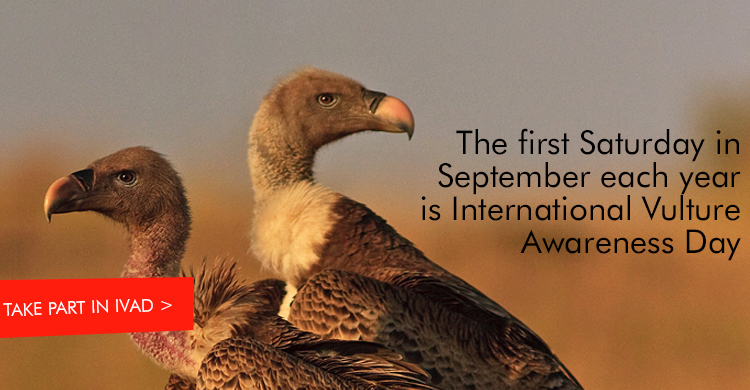International Vulture Awareness Day (IVAD) on 7 September 2019
Abu Dhabi, 5 September 2019 - The IUCN Red List status of African-Eurasian vultures has seen drastic changes for the worse in recent years. Eight (of 16) species are listed as Critically Endangered and three more are listed as Endangered due to poaching, poisoning (intentional and otherwise), habitat loss, electrocution by powerlines, collision with wind turbines, food declines and various other threats. There is a real risk that several vulture species will become extinct in the near future unless effective conservation actions are implemented across the range of these birds.
The first Saturday in September each year is designated as International Vulture Awareness Day (IVAD) – a great opportunity to show our gratitude to vultures for the relatively unpleasant job they do for us every day, and to remind people that vultures are the most endangered group of landbirds in the world. IVAD is also offers the chance to publicise the conservation of vultures to a wider audience, to raise awareness about the plight of this endangered group of birds and to highlight the important work being carried out by the vulture conservationists across the globe.
The initiative is run jointly by the Birds of Prey Programme of the Endangered Wildlife Trust in South Africa and the Hawk Conservancy Trust in England. Organisations participating in IVAD carry out their own activities, highlighting vulture conservation and raising awareness. Please visit the website to see the types of activities and celebrations planned for IVAD across the world. If you are intending to get involved by organizing an IVAD event to celebrate vultures, the website provides numerous freely-available downloads, such as colouring pages, vulture maze and a memory game.
Vultures are Nature’s clean-up crew, they provide critically important ecosystem services by consuming carcasses and other organic waste in the environment that could otherwise nurture disease. Theycan travel across huge areas, which is why conservation actions can only be effective if implemented at a flyway level, requiring a broad approach and engagement of all countries throughout their ranges. This realisation, underpinned by catastrophic declines of vulture populations in Asian and African led to agreement on the urgent need to develop an international action plan under the Convention on the Conservation of Migratory Species of Wild Animals (CMS) to conserve African-Eurasian vultures.
As a result, the Coordinating Unit of the Raptors MOU, in partnership with the IUCN Vulture Specialist Group, BirdLife International and the Vulture Conservation Foundation, spearheaded the development of a Multi-species Action Plan to Conserve African-Eurasian Vultures (Vulture MsAP, a summary version is available here). This Action Plan was adopted by CMS Parties at their 12th Conference of Parties (COP12) in October 2017. Core funding was provided by Environment Agency – Abu Dhabi, on behalf of the Government of the United Arab Emirates, with significant additional financial support contributed by the Federal Office for the Environment, Switzerland.
Developed over a period of three years, in consultation with 128 Range States, the Vulture MsAP sets out a comprehensive framework of conservation objectives, priority actions and organisational matters. It provides a conservation action plan covering the geographic ranges of all 15 migratory Old World vultures and aims to rapidly halt current population declines and to achieve recovery of populations of all species to favourable levels by 2029. Additionally, the Vulture MsAP provides conservation management guidelines that can be adapted by all Range States covered by plan.
Furthermore, the Vulture MsAP incorporates the following documents as key components:
- Egyptian Vulture Flyway Action Plan (EVFAP) - Annex 4;
- Cinereous Vulture Flyway Action Plan (CVFAP) - Annex 5;
- Blueprint for the Recovery of South Asia's Critically Endangered Gyps Vultures (SAVE Blueprint) - Annex 6
The Vulture MsAP acts as an international roadmap for the recovery and conservation of African-Eurasian vultures. Governments in each Range States are strongly encouraged to refer to it when developing their own national or regional Vulture Conservation Strategies or species actions plans. This critically important step facilitates targeted collaborative conservation actions internationally, and should complement and support existing National Biodiversity Strategies and Action Plans already in place under the Convention on Biological Diversity.
To further assist Range States, the Coordinating Unit has commissioned a consultant to develop a Strategic Implementation Plan for the Vulture MsAP, which is anticipated to be published before the end of the year. For further information, please contact Nick P. Williams, Head of the Coordinating Unit at [email protected].
Last updated on 09 September 2019



